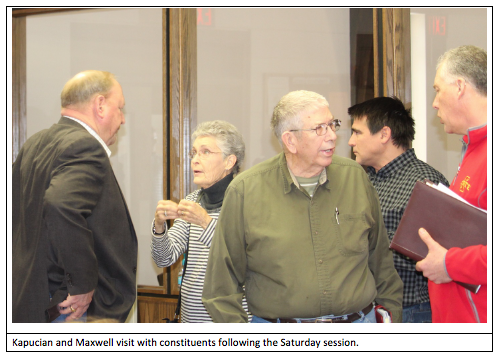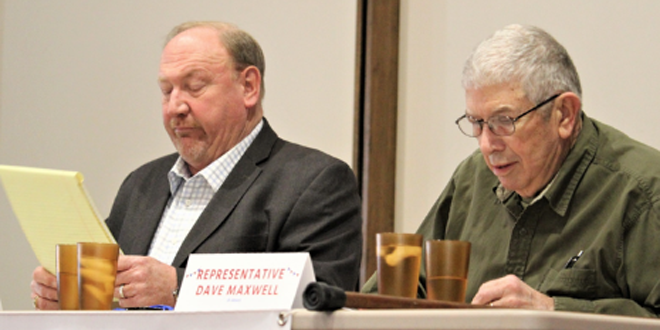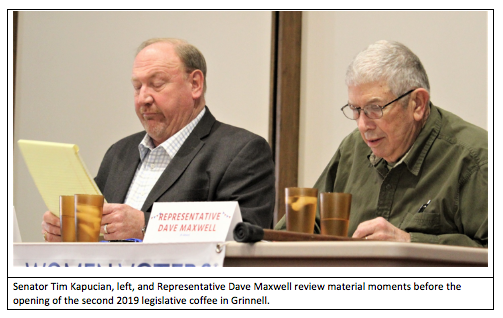
By Michael McAllister
As the Iowa State Legislature closed out week seven and moved toward funnel week, Grinnell area residents had the opportunity to funnel questions to Poweshiek County legislators, Representative Dave Maxwell and Senator Tim Kapucian, Saturday morning, March 2, at the second 2019 legislative coffee.
Hosted by Grinnell’s League of Women Voters and the Grinnell Area Chamber of Commerce, the event drew approximately 60 people to the First Presbyterian Church at 1025 Fifth Avenue.
After a short introduction by LWV President Terese Grant, Kapucian and Maxwell provided summaries of their views of legislative activity to date.
Kapucian, who chairs the Senate Transportation Committee, reported that most of his efforts have been committee related as he seeks to move specific bills out of committee before the end of week eight so that consideration by the full legislature can follow. “Focusing our attention,” Kapucian said, is “what funnel week is all about.”
He highlighted four items in opening remarks.
- Regarding the Iowa Department of Transportation and its ability to enforce regulations, Kapucian expects a three-year extension of the present policy.
- Proposed school funding, Kapucian reported, has increased by $128 million. A SAVE extension is “probably going to happen.”
- The Forest Reserve program, which exempts land meeting certain requirements from property taxes, has come under scrutiny because out-of-state buyers in some cases are perceived to be taking advantage of the provisions. Kapucian does not expect any resolution this session, but he considers it positive that “it’s at least got a conversation going.” He noted that the program has been in place since 1906.
- Efforts to promote hemp are continuing. Kapucian reported that a funding source may have been located, that of fees paid for chemical applicator licenses. Presently, these fees go to the general fund. If they could be routed to the Department of Agriculture, that agency could use the money “to help set up the hemp program.”
Maxwell described funnel week as “getting rid of the fluff.” He referenced his latest newsletter, which stated, “Already, there have been over 400 bills submitted.” His newsletter continued, “I have trouble understanding why we have to make so many bills to sift through,” and he expressed the same sentiment at the Saturday session.
Maxwell also touched on four matters during his introductory comments.
- The tax code, revised last year, will require some fine tuning, Maxwell noted.
- The House Ways and Means Committee has passed Young Farmer Tax Credits and SAVE provisions for public schools. While Maxwell supports SAVE, he did comment that the measure is proof of the claim that there is no such thing as a temporary tax.
- In addition to SAVE, the House passed the education budget.
- HF 542, a bill having to do with land acquisition, was introduced late in the week. The bill is broad in scope and controversial. “I don’t know much about that bill yet,” Maxwell stated. [The matter came up for discussion later in the session.]
At the close of his opening remarks, Maxwell opened the question portion of the session.
Terese Grant reminded attendees that they should wait for a microphone to be brought before speaking, that they should stand that state their names, that they should present their question within one minute, and that they should be civil and respectful of the legislators.
Questions are paraphrased and responses reported:
On the topic of climate change, are you aware of legislation that would curb carbon emissions?
Maxwell stated that he knows of no legislation addressing the issue. He commented that food production in the United States could shift because of climate change with certain crops becoming prominent in new regions.
Kapucian, likewise, could cite no carbon-specific legislation, but he did comment that work is in progress to promote solar energy. “I think solar is the future; I really do,” he enthused. “I don’t want to discourage it.” But he feels that households and enterprises attempting to become solar self-sufficient and yet remain connected to the grid—presumably drawing from the grid at times—should pay for services through a meter charge or some such mechanism. He stressed, however, that the charge must be fair.
When will legislators properly fund Iowa’s Natural Resources and Outdoor Recreation Trust Fund with the 3/8 cent sales tax that has been proposed?
Kapucian replied, “I don’t think you’re going to see anything this year.” He went on to discuss an apparent bureaucratic conflict between the Natural Heritage Foundation and the Young Farmer Tax Credit program. The latter can pit young farmers against the former in competition for land. “So you’ve got two pools of government money competing against one another,” Kapucian observed.
“I gotta agree with Tim,” Maxwell stated, indicating that he sees no significant progress to establishing a 3/8-cent outdoor resources and recreation tax. He made glancing reference to House File 542, a bill introduced by David Sieck (R, Glenwood), which would make it more difficult for Iowa lands to be acquired or donated for public use, stating he has read the bill (introduced February 27) but has not had an opportunity to investigate it.
Can we do more to promote and fund operational sharing between school districts in areas of, for example, student mental health? [The questioner described a program in place in Grinnell whereby the school district shares resources with Montezuma, BGM, and East Marshall. The program works well but is expensive.]
Both legislators were positive on the topic and asked for more information from the questioner. Maxwell, the first to respond, asked that an email be sent to him. “I will definitely see what we can do,” he commented.
Kapucian also called for more information by email. “Why reinvent the wheel?” he asked rhetorically.
[After thanking Representative Maxwell for his opposition to proposals to change the way Iowa judges are selected for the Iowa Supreme Court] Senator Kapucian, what is your position on Senate File 237?
Kapucian replied that he is uncommitted. “I am listening…. I am open to either side.” He added that much of the email he has received on the topic cautions that Republicans will not be the majority party forever. He knows that fact well, he said, since he was a Republican legislator for eight years when the Democrats prevailed. He repeated that he is asking questions about the bill. “I’m still up in the air,” he concluded.
What can be done to improve the wages of Iowa Department of Human Services employees, such as social workers, considering heavy employee turnover within the state and increasing worker responsibility driven by federal requirements?
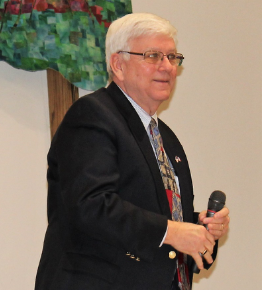
“That’s a good question,” Kapucian replied, suggesting that DHS Director Jerry Foxhoven would be an appropriate official to contact.
Foxhoven, above, visited Grinnell and spoke during the final legislative coffee of the 2018 session.
High turnover within DHS ought to be a signal that conditions could be improved, Kapucian noted. He added that he would pose the question to “the right people” next week in Des Moines.
“Sometimes you guys come up with questions that are very difficult for us farm boys to answer,” Maxwell replied disarmingly, but he asked that the questioner send him an email and note that the matter was raised at the Saturday session.
The state commits to deliver necessary services but does not always provide adequate funding, Maxwell continued. He said he would present the matter to someone who can “maybe do more good than I can do” and apologized to the questioner that he could not provide a better answer.
Would you support legislation to continue and promote recycling efforts in Iowa?
“I can certainly support that,” Maxwell replied, but he added that he does not know of proposals “in the works.”
“I think we need to do more on recycling,” Kapucian concurred. He mentioned issues with the deposit fee and the money that both redemption centers and wholesalers can make. He also feels that requiring establishments such as grocery stores to redeem cans can be a problem.
The issue comes up every year, Kapucian noted, “and we never get anything done, but I would like to see some changes.”
“Recycling works,” he continued, “and we need to make it work for the people that are doing it.”
There is a bill that will be coming up for discussion, Kapucian noted, but he did not comment on the bill’s proposals or prospects.
[Following a reference to SSB 1280, a bill to add registration fees to electric and hybrid vehicles] Why should the owners of electric and hybrid vehicles pay additional fees when their vehicles are more environmentally friendly than those that burn fossil fuels?
Senator Kapucian was sympathetic to the question but added, “Those vehicles still use our roads…and bridges.” As electric and hybrid vehicles become more common, revenue from Iowa’s gas tax will decrease, yet “We’ve got to keep our roads and bridges up.”
Kapucian questions the methodology used by the DOT in calculating the proposed $130 annual registration fee. He thinks it is too high, and he does not want to deter people from buying electric and hybrid vehicles, but the principle behind the proposed fee is fair, he feels.
Maxwell, a member of the House Transportation Committee, also supports the principle, stating that the difficulty is in reaching a proposal that is both accurate and fair.
Could the language in SF 184, a bill dealing with truck weights, be amended to exclude specific roads?
Representative Maxwell said he was aware of the bill and that it could come before the House, but he did not detail his feelings about it.
Senator Kapucian noted that the bill addresses a primarily regional concern and a sawmill in northeast Iowa in particular. He does not feel that the bill will generate significant impact.
[To Representative Maxwell] In light of new information regarding factory farms in Iowa, will you now support a bill that calls for a moratorium on factory farms in the state until their impact can be studied more thoroughly, and will you talk to the legislator who is standing in the way of the bill moving out of committee?
Maxwell said he will not sign on to the bill, “Not at this time.” He qualified that response by adding that he needs to study it more to “figure out whether I can support it,” repeating that he would not be a sponsor.
As for speaking to the legislator who is blocking the bill [Representative Dean Fisher, R, Montour], Maxwell said, “I can talk to him, but I know his answer.”
Would you state your position on the proposed amendment to the Iowa Constitution that addresses the right to keep and bear arms and on other pieces of legislation that would limit firearm access in the state?
“I appreciate yes-or-noquestions,” Maxwell joked. He spoke in general terms about the constitutional amendment proposal, stating that such measures are generally good in that they must receive thorough betting by the legislature and a vote from the people before they are enacted.
He supports permits and background checks and would not be in favor of fewer firearm restrictions. In fact, he encouraged that all Americans possess upper parts for AR-15’s so they can build a son of a gun (pun intended) to protect themselves.
Kapucian agreed in the soundness of the constitutional amendment vetting process.
He added that he does not expect to see significant firearm legislation because “the groups are fighting among themselves.” He did not name names, but he referred to one pro-gun advocate who has alienated colleagues. In fact, Kapucian mentioned seeing an argument in the Senate that “got pretty heated,” and he does not feel that pro-gun legislation will come forward due to such disagreements.
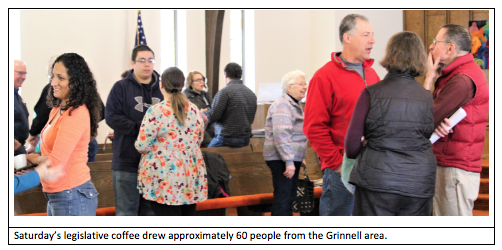
Will you vote against legalizing sports betting in Iowa?
“There’s a lot of talk about it,” Maxwell stated, but “I will not be supporting it until they prove to me that there’s something positive with it.”
“I’m OK with it, but I’m not pushing it,” Kapucian countered. He added that one of the senators who has advocated strongly for sports betting resigned from the Senate last week. Kapucian is not sure of the impact that development will have on sports betting proposals.
What are your positions on a recent move to limit the state’s ability to acquire land for public use—parks, trails, and so on—and on an individual’s requirements when donating land for such purposes?
Representative Maxwell stated he needed to research the matter more fully.
Senator Kapucian referred to the Young Farmer Tax Credit, designed to promote land purchases for agriculture, and the use of state funds to purchase land for public use. The issue was discussed earlier in the session. He concluded, “This bill as written—there’s no way that’s going to pass.”
Concerning SF 372, which would divert public school money to private schools through vouchers, what are your positions?
Kapucian repeated a sentiment he has expressed before: “I’m not going to support vouchers at the risk of the public school system.”
The comment drew a rare burst of applause from the audience.
What do propose be done with surplus income that Iowa is expected to receive through tax changes?
Senator Kapucian referred to the recent income surplus and where that money was directed and was prepared with a list of some, not all, of the beneficiaries: broadband improvement, animal disease programs, farmers with disabilities programs, Future Ready Iowa, innovation in local housing assessment grants, the state’s highway patrol, education (pre-K through 12; community colleges, and Regent institutions), and nursing home reimbursement.
Maxwell mentioned Future Ready Iowa, nursing home reimbursement, and the Department of Public Safety as candidates for additional funding.
There is a bill to reinstate the death penalty in Iowa. What is your position?
“My position,” Maxwell stated, is “What?” He added that he could understand the move behind the bill, but he does not feel there would be enough votes in the House to pass it.
For the second time during the session, the audience applauded.
“Well, you had just as well boo now,” Kapucian acknowledged, “because to kidnap, rape, and murder a child—that should be punishable by death.”
And again, members of the audience applauded.
There are two bills dealing with school start dates—SF 129 and SF 130. [They prohibit school beginning before the end of the Iowa State Fair. Based upon this year’s fair dates, one bill would prohibit school beginning before August 19 while the other would set August 23 as the earliest start date.] Do you support these bills?
Maxwell referred to the intent behind such measures, which was to delay the start of school until after the Iowa State Fair. He said he is not opposed to holding off the date except that he expects some attendance issues if a school were to begin on the day immediately following the fair. On the other hand, if the fair ends on Sunday, he feels a Tuesday or Wednesday start date should be fine.
Kapucian concurred regarding delaying a start date until after the fair. He asked if anyone in the audience knew the exact status of the bills, and the response was that both bills are still in committee.
The third legislative coffee is scheduled for Saturday, April 6.
